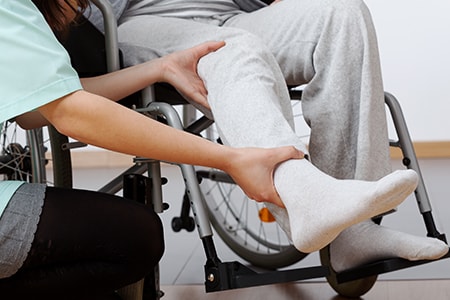I Was Hurt on Someone Else’s Property
When you visit another person’s property, there is always the chance of an accident occurring. This may happen when you are over at a friend’s house, shopping in a grocery store or retail establishment, dining out at a restaurant, visiting a museum or another public building, vacationing at a resort, or any number of other places. These are occasions when you are supposed to be enjoying yourself, and the last thing you want to deal with is an injury.
Sometimes these types of accidents produce minor injuries. At other times, however, the injuries are more serious, requiring medical attention and causing you to miss some time from work. In the most severe cases, being hurt on someone else’s property can result in temporary or permanent disability, which can take a major physical, emotional, and financial toll on victims and their families.
There are several types of injures that frequently occur on the property of another party, some of the most common include:
- Slips, trips and falls;
- Dog bites and animal attacks;
- Swimming pool accidents;
- Amusement park accidents;
- Fires and floods;
- Elevator and escalator accidents;
- Defective conditions on the premises;
- Inadequate premises maintenance;
- Inadequate premises security;
- Exposure to hazardous substances.
If you were injured on someone else’s property, you may be able to bring a premises liability claim against them. In order to determine if it may be worthwhile to pursue legal action, however, there are a couple important questions you need to ask:
- Did you have a right to be on the property?
Property owners and occupants owe a duty of care to take reasonable measures to keep the property safe and free from known hazards. The duty of care owed is different, however, depending on the type of visitor that enters the premises. In Alabama, there are three different categories of visitors:
- Invitees: The highest duty of care is owed to those who have explicit or implied permission to be on the property. These may include those who enter the property for commercial or business purposes, such as customers, clients, or hotel guests. A landowner must use reasonable care to keep the premises safe for invitees, and adequately warn them of any known hazards.
- Licensees: The next category of visitor is a licensee. This might be a salesperson, social guest (such as a friend who is invited to a party), or neighbor. The duty of care owed to licensees is higher than that of trespassers, but lower than invitees. Landowners must refrain from willfully or wantonly injuring a licensee or injuring a licensee by negligently exposing them to various dangers and hazards.
- Trespassers: The lowest duty of care is owed to those who enter a landowner’s property without permission, commonly known as trespassers. The only obligation a landowner has with regards to trespassers is to refrain from willful or wanton misconduct or entrapment.
If you were injured on someone else’s property and fall into the category of an invitee, a premises liability claim might have a chance to be successful. Your chances are reduced if you were a licensee, and if you were trespassing, legal action against the landowner is probably not a realistic option.
- Who is Responsible for the Incident?
Landowners are not always responsible for injuries that occur on their property, even if the injured party was an invitee or licensee. They are only responsible if you can prove the following:
- The owner/occupant owed you a duty of care;
- The owner/occupant breached the duty owed to you;
- This breach is the proximate cause of your injury;
- The injury resulted in compensable damages.
Alabama uses the doctrine of “contributory negligence”. This means that if a plaintiff shares any of the fault for their injury, they are not allowed to collect damages. In a premises liability case, there is a good chance the defendant will claim that you are at least partially responsible for the injury.
For example, they may claim that you were not watching where you were going, you were in a restricted area, the dangerous condition was clearly marked, the dangerous condition was open and obvious to a reasonable person, or another defense. If any of these claims stick, you will not be able to collect compensation for your injuries. For this reason, it is important to thoroughly document the incident with multiple photographs, favorable statements from witnesses, and any other evidence you can gather that will help your case.
Speak with an Experienced Alabama Premises Liability Lawyer
Premises liability cases can be complex and are very difficult to win in Alabama. If you were hurt on someone else’s property and you believe you might have a claim, it is important to speak with a skilled personal injury lawyer as soon as possible. At Burge and Burge, we have extensive experience with this area of the law, and we can assess your case to determine if bringing a premises liability claim is a viable option.
For a free consultation with one of our attorneys, contact our office today at 205-251-9000.




Leave a Reply
Want to join the discussion?Feel free to contribute!